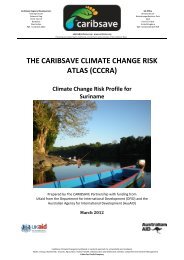Create successful ePaper yourself
Turn your PDF publications into a flip-book with our unique Google optimized e-Paper software.
The field work components of the research <strong>and</strong> CARIBSAVE’s commitment to institutional strengthening in<br />
the Caribbean have helped to build capacity in a wide selection of ministries, academic institutions,<br />
communities <strong>and</strong> other stakeholders in the areas of: climate modelling, gender <strong>and</strong> climate change, coastal<br />
management methods <strong>and</strong> community resilience. Having been completed for 15 countries in the<br />
Caribbean Basin, this work allows for inter-regional <strong>and</strong> cross-regional comparisons leading to lesson<br />
learning <strong>and</strong> skills transfer.<br />
A further very important aspect of the CCCRA is the democratisation of climate change science. This was<br />
conducted through targeted awareness, tools (e.g. data visualisation, GIS imagery, animated projections<br />
<strong>and</strong> short films), <strong>and</strong> participatory approaches (workshops <strong>and</strong> vulnerability mapping) to improve<br />
stakeholder knowledge <strong>and</strong> underst<strong>and</strong>ing of what climate change means for them. Three short films, in<br />
high-resolution format of broadcast quality, are some of the key outputs. These films are part of the<br />
Partnerships for Resilience series <strong>and</strong> include: ‘Climate Change <strong>and</strong> Tourism’; ‘Caribbean Fish Sanctuaries’;<br />
<strong>and</strong> ‘Living Shorelines’. They are available at www.youtube.com/Caribsave.<br />
Project approach to enhancing resilience <strong>and</strong> building capacity to respond to climate change<br />
across the Caribbean<br />
Processes <strong>and</strong> outputs from the CCCRA bridge the gap between the public <strong>and</strong> private sectors <strong>and</strong><br />
communities; <strong>and</strong> their efforts to address both the physical <strong>and</strong> socio-economic impacts of climate change,<br />
allowing them to better determine how current practices (which in fact are not isolated in one sector<br />
alone) <strong>and</strong> capacities must be enhanced. The stages of the CCCRA country profile protocol (see Flow Chart<br />
on following page) are as follows: a) Climate Modelling <strong>and</strong> Data Analysis (including analysis of key ‘Tier 1’<br />
climate variables linking the climate modelling to physical impacts <strong>and</strong> vulnerabilities) b) Physical Impacts<br />
<strong>and</strong> Vulnerability Assessment c) Tourism <strong>and</strong> Related Sector Vulnerability Assessments (including<br />
examination of the sectors of water, energy, agriculture, biodiversity, health, infrastructure <strong>and</strong> settlement,<br />
<strong>and</strong> comprehensive disaster management) d) Development of Vulnerability Profile with stakeholders taking<br />
account of socio-economic, livelihood <strong>and</strong> gender impacts (including evaluation of ‘Tier 2’ linking variables<br />
<strong>and</strong> indicators such as coastal inundation) e) Adaptive Capacity Assessment <strong>and</strong> Profiling f) Development of<br />
Adaptation <strong>and</strong> Mitigation Strategies <strong>and</strong> Policy Recommendations (action planning). The final stages<br />
depicted in the flow chart focusing on the implementation of policies <strong>and</strong> strategies at<br />
ministerial/government level <strong>and</strong> the implementation of actions at community level, using a communitybased<br />
adaptation approach, are proposed to be implemented as part of the forthcoming CCCRA process as<br />
projects to be funded by other donors post the country profile stage.<br />
The work of the CCCRA is consistent with the needs of Caribbean Small Isl<strong>and</strong> <strong>and</strong> Coastal Developing<br />
States identified in the document, “Climate Change <strong>and</strong> the Caribbean: A Regional Framework for<br />
Development Resilient to Climate Change (2009-2015)”, published by the Caribbean Community Climate<br />
Change Centre (CCCCC); <strong>and</strong> supports each of the key strategies outlined in the framework’s Regional<br />
Implementation Plan.<br />
xii





